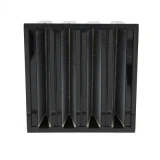Operation of Activated Carbon Filters
2024-07-08
Activated carbon filters are highly effective filtration systems used to remove contaminants and impurities from air, water, and other fluids through the process of adsorption. Here’s an overview of activated carbon filters, their operation, applications, and benefits:
Operation of Activated Carbon Filters
1. Adsorption Process:
- Activated carbon is a porous material with a large surface area that attracts and traps organic compounds, chemicals, and impurities through adsorption.
- Adsorption differs from absorption in that molecules adhere to the surface of the carbon, rather than being absorbed into it.
2. Mechanism:
- Contaminants in air or water pass through the activated carbon filter.
- Organic molecules, gases, and odors adhere to the porous surface of the carbon.
- Clean air or water exits the filter, while pollutants are effectively trapped within the carbon matrix.
Applications of Activated Carbon Filters
1. Air Purification:
- Indoor Air Quality (IAQ): Used in HVAC systems and air purifiers to remove volatile organic compounds (VOCs), odors, and airborne pollutants.
- Industrial Applications: Control emissions, fumes, and odors in manufacturing processes and industrial facilities.
2. Water Treatment:
- Drinking Water Filtration: Remove chlorine, chloramines, organic compounds, and unpleasant tastes and odors from municipal or well water.
- Wastewater Treatment: Purify water for reuse in industrial processes and municipal wastewater treatment plants.
3. Environmental Remediation:
- Groundwater Treatment: Clean up contaminated groundwater by adsorbing pollutants such as organic solvents and pesticides.
- Air Pollution Control: Mitigate emissions from industrial stacks and exhausts by capturing volatile compounds and particulates.
4. Medical and Pharmaceutical:
- Respiratory Protection: Masks with activated carbon filters can provide enhanced protection against airborne particles, pollutants, and allergens.
- Purification of Pharmaceuticals: Remove impurities from pharmaceutical products during manufacturing.
5. Food and Beverage Industry:
- Food Processing: Purify air in food processing plants to maintain product quality and safety.
- Beverage Production: Remove organic contaminants and off-flavors from water used in beverage manufacturing.
Benefits of Activated Carbon Filters
- Versatility: Suitable for both air and water filtration across various industries and applications.
- Effective Adsorption: High surface area and microporous structure of activated carbon enhance adsorption efficiency, capturing a wide range of contaminants.
- Removal of Organic Compounds: Effectively removes volatile organic compounds (VOCs), chemicals, chlorine, and other impurities that affect taste, odor, and health.
- Longevity: Durable and long-lasting filters that require periodic replacement based on usage and contaminant levels.
- Environmentally Friendly: Provides a sustainable solution for pollutant removal without chemical additives or byproducts.
Activated carbon filters are valued for their ability to improve air and water quality by effectively removing contaminants and improving overall health and safety in various environments. They are essential components in filtration systems where purity, odor control, and compliance with regulatory standards are critical.



